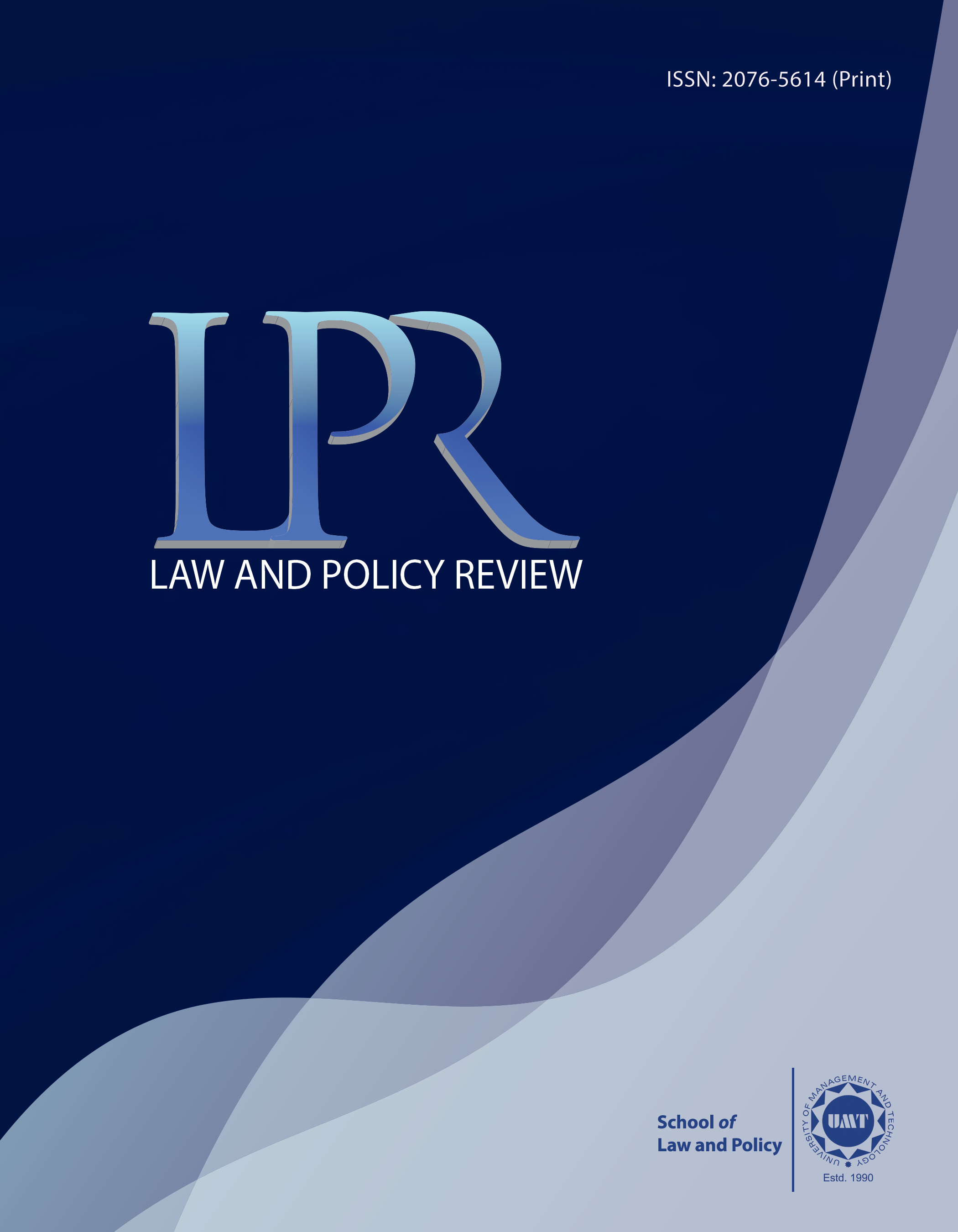Memorandum of Test Identification Parade (TIP): Omissions by the Magistrates and Ways to Make it Comprehensive
Abstract
 Abstract Views: 0
Abstract Views: 0
This study aims to spotlight the imperfections and their causes in the preparation of the memorandum (memo) of Test Identification Parade (TIP) by the magistrates. It also aims to explicate that TIP can only be treated as corroboratory evidence, if such is strictly in accordance with the relevant laws elaborated by the Supreme Court of Pakistan (SC). This study further provides a comprehensive set of guidelines and recommendations to make the process and memo of TIP all-inclusive. Analytical legal research technique was used in this research. The data was secondary and qualitative. Data was collected from the official website of Pakistan Law Site and from the websites of the constitutional courts of Pakistan. Facts and circumstances of each and every case and relevant enactments, rules, and notifications were also investigated. An analysis of 23 reported cases involving TIP from 2017 to 2023 concluded that in more than 65% of cases, the magistrates did not make good as required by the law. The approval of SC was granted in only about 35% of cases based on the availability of undeniable evidence. In Pakistan, no enactment provides the procedure of TIP, although guidance is sought from Punjab Police Rules, 1934 (PPR, 1934), Rules and Orders of Lahore High Court, Lahore 1996 (R&O), Circulars of the Government of Punjab, and a number of case laws set by the SC. The conduct of TIP by executive magistrates with no legal expertise and by judicial magistrates with no prior training or experience are the main reasons behind the faulty memos of TIP. In light of all the relevant rules, circulars, and especially the relevant case laws, a compendium of guidelines, instructions, and precautions for writing a comprehensive memo of TIP is recommended at the end.
Downloads
References
Abdul Haq and others v. the State, SCMR 116 SC (2020). https://www.supremecourt.gov.pk/downloads_judgements/crl.p._29_q_2015.pdf
Ajwad, W. (2021). Handbook of criminal investigation in Pakistan. Independently Published.
Ali Taj and another v. the State, SCMR 900 SC (2023). https://www.supremecourt.gov.pk/downloads_judgements/j.p._255_2018.pdf
Ansar and others v. the State and others, SCMR 929 SC (2023). https://www.supremecourt.gov.pk/downloads_judgements/j.p._405_2021.pdf
Asfand Yar Khan v. the State and others, PLD 488 SC (2019). https://www.supremecourt.gov.pk/downloads_judgements/Crl.M.A._183_2019.pdf
Atta-Ur-Rehman and another v. the State, SCMR 372 SC (2018).
Azhar Mehmood v. the State, SCMR 135 SC (2017). https://www.supremecourt.gov.pk/downloads_judgements/Crl.A._128_2010.pdf
Gulfam and another v. the State, SCMR 1189 SC (2017).
Hakeem and others v. the State, SCMR 1546 SC (2017).
Javed Khan Alias Bacha and another v. the State, SCMR 524 SC (2017). https://www.supremecourt.gov.pk/downloads_judgements/Crl.A._126_2010.pdf
Kamal Din Alias Kamala v. the State, SCMR 577 SC (2018).
Lal Pasand v. the State, PLD 142 SC (1981).
Majeed Alias Majeedi and others v. the State and others, SCMR 301 SC (2019).
Mian Sohail Ahmed and others v. the State and others, SCMR 956 SC (2019). https://www.supremecourt.gov.pk/downloads_judgements/Crl.A._306_L_2012.pdf
Muhammad Ali and others v. the State, SCMR 2024 SC (2022). https://www.supremecourt.gov.pk/downloads_judgements/crl.a._363_2021.pdf
Muhammad Amin v. the State and another, SCMR 2057 SC (2019).
Muhammad Faisal Abbas v. the State, SCMR 1285 SC (2019).
Muhammad Hayat and another v. the State, SCMR 92 SC (2021). https://www.supremecourt.gov.pk/downloads_judgements/crl.sh.a._12_2017.pdf
Muhammad Ramzan v. the State and others, 2023 LHC 3274. https://sys.lhc.gov.pk/appjudgments/2023LHC3274.pdf
Muhammad Siddique and others v. the State, SCMR 342 SC (2020). https://www.supremecourt.gov.pk/downloads_judgements/j.p._24_2016.pdf
Muhammad Yaqoob and another v. the State, PCRLJ 2227 (1989).
Muhammad Zubair and another v. the State and another, SCMR 1210 SC (2019).
Noor Islam v. Ghani ur Rehman and another, SCMR 310 SC (2020).
Perera, E. M. N. (2021). Identification parades: The evidentiary value & the credibility of the witness in identifying suspects for criminal investigations in Sri Lanka. KDU Journal of Multidisciplinary Studies, 3(1), 41–49.
Punjab Constabulary. (n.d.) Punjab police rules, 1934. https://punjabcode.punjab.gov.pk/uploads/articles/punjab-police-promotion-rules-1934-pdf.pdf
Rajamanickam, R., & Kung, K. B. (2017). Identification parade: Current position and issues in Malaysia. European Proceedings of Social and Behavioural Sciences, 44, 893–902. https://doi.org/10.15405/epsbs.2018.07.02.94
Rules and Orders of the Lahore High Court, Vol.III, C.11-C, (1996) https://lhc.gov.pk/system/files/volume3_0.pdf
State through Advocate General Sindh Karachi v. Farman Hussain and others, PLD 1 SC (1995).
Syed Anwar Ali Shah and another v. Irfan Ali and others, SCMR 1214 SC (2019).
Tasar Mehmood and another v. the State and others, SCMR 1013 SC (2020). https://www.supremecourt.gov.pk/downloads_judgements/crl.p._574_2019.pdf
The Pakistan Code. (1984). Qanun-e-Shahadat Order, President’s Order No.X. https://pakistancode.gov.pk/english/UY2FqaJw1-apaUY2Fqa-apaUY2FwbJs%3D-sg-jjjjjjjjjjjjj
The State through PG Sindh and others v. Ahmed Omer Sheikh and others, SCMR 873 SC (2021). https://www.supremecourt.gov.pk/downloads_judgements/crl.a._599_2020_26032021.pdf
Zahid Iqbal v. the State, SCMR 1543 SC (2017).
Zia, M. H., Hassan, H., & Ali, A. (2021). Reliability of eyewitness memory: A case study. Journal of ISOSS, 7(2), 361–370.
Zohaib, R., & Baig, M. S. R. (2021). Fairness and effectiveness of identification parade in management of justice system in Pakistan. Premier Law Journal, 1(4), 26–43.
Copyright (c) 2023 Mudassir Maqsood, Sana Younas

This work is licensed under a Creative Commons Attribution 4.0 International License.
LPR follow an open-access publishing policy and full text of all published articles is available free, immediately upon publication of an issue. The journal’s contents are published and distributed under the terms of the Creative Commons Attribution 4.0 International (CC-BY 4.0) license. Thus, the work submitted to the journal implies that it is original, unpublished work of the authors (neither published previously nor accepted/under consideration for publication elsewhere). On acceptance of a manuscript for publication, a corresponding author on the behalf of all co-authors of the manuscript will sign and submit a completed the Copyright and Author Consent Form.





